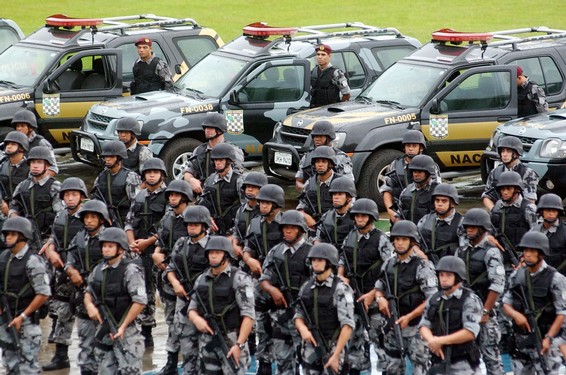One of the last significant acts by Flavio Dino as Brazil’s minister of justice, before President Lula appointed him to the Supreme Court on November 27, was to authorize the deployment of the National Public Security Force to disrupt the flow of drugs and money into Rio de Janeiro. The force, created during Lula’s first term in 2004, sent about 300 specially trained civil and military police from across the country to carry out Operation Tide on October 16.
In mid-November, Minister Dino and President Lula announced that Operation Tide would be extended until January 2024. On November, via a public records request from GloboNews, the public finally learned some of the details.
State and federal governments have mobilized the National Force plenty of times since it was created. Brazil measures the “success” of these types of operations in terms of high-profile seizures and arrests, and in the case of Operation Tide there have been none.
Most drug shipments from trafficking groups enter Brazil’s big cities by truck. But thus far, Operation Tide appears to have stopped and searched only seven trucks, among over 10,000 inspections conducted of vehicles and pedestrians.
Extending this operation would seem somewhat at odds with the administration’s promise to deliver evidence-based drug policy.
The costs of harassing Rio de Janeiro’s public like this have been exorbitant: over $2 million USD. Aside from the sums spend on shotguns, assault rifles, grenades and other new equipment, over $700,000 to date has been spent on daily allowances for Operation Tide agents—a staggering investment relative to the cost of living in Brazil.
No significant drug or firearm seizures are reported so far. Some agents have been robbed, after going to the wrong location by mistake. At least one has been killed. Extending this operation into the next calendar year would seem somewhat at odds with the administration’s promise to deliver evidence-based drug policy.
No government genuinely interested in public security and disempowering organized trafficking groups would pretend to find value in stop-and-search operations. No government genuinely interested in reducing violence would defend the mobilization of militarized police forces. The focus on curbing the supply of drugs and guns, veiled in the language of “intelligence” and “security,” has not only failed to meaningfully reduce trafficking but has exacerbated violence.
The presence of the National Force in Rio de Janeiro is a government PR stunt.
Rather than investing exorbitant sums in militarized theatrics, we urgently need to legalize and regulate the whole supply chain of drug production, commerce, distribution and consumption. A legal market that generates jobs and revenue can be channelled to fund harm reduction programs; responsible education about drug use in school curriculums; and treatment centers that represent more humane alternatives to the notorious therapeutic communities. Of course, the government would have to be interested in such things more than it is interested in mass incarceration.
The presence of the National Force in Rio de Janeiro is more of a government PR stunt than a legitimate strategy. It’s performance politics at its worst: an expenditure of funds not intended to yield a solution to anything. Meanwhile, Lula’s administration resists the transparency that might actually lead to some accountability.
Karl Marx once said that, “History repeats itself, first as a tragedy, second as a farce.” But this second act of Operation Tide is sure to be another tragedy to follow the first.
Photograph of National Public Security Force by Fabio Pozzebom via Wikimedia Commons/Creative Commons 3.0





Show Comments